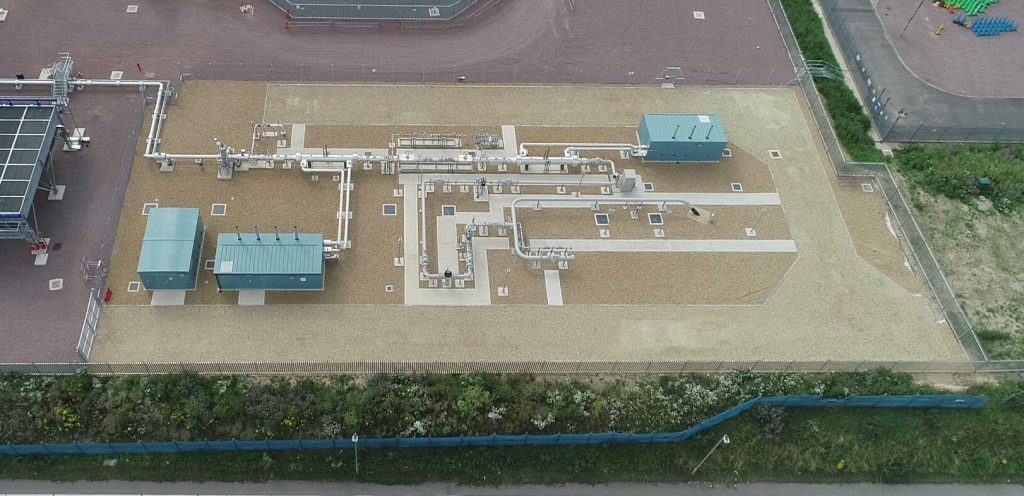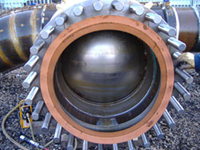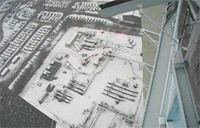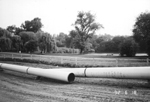
Typical Projects
HYDROGEN RESEARCH PROJECT (R & D)
RCS were instrumental in the design of a test facility (research and development) for the initiation of proposals to convert the existing UK natural gas networks to transport Hydrogen. This facility was built as part of an overall programme of work proposed in the Ofgem Network Innovation Competition project. With the overall aim of providing quantified safety based evidence to confirm whether the existing gas distribution networks of Great Britain are suitable to transport 100% hydrogen.
The test facility was designed and built to understand the potential changes in background leakage levels in pipes and fittings which currently carry natural gas. A strategic set of tests were undertaken to cover a range of assets and pipe considered representative across the GB gas network. A cross section of these assets were removed from the network and transported to the test site where controlled leakage testing with natural gas and hydrogen will took place.
450NB Feeder 18 Pipeline Diversion Detailed Design:
Our client was required to divert a 450NB HP feeder pipeline, in order to facilitate a road upgrade.
The existing 450NB pipeline was constructed from linepipe of standard wall thickness and therefore needed to be replaced with heavy wall pipe at locations affected by the proposed road scheme to comply with the requirements of IGEM TD/1 Edition 5.
Rush Construction Services Ltd (RCS Ltd) were commissioned to carry out a detail design study (DDS) for the diversion beneath the proposed dual carriageway. Two designs were developed in conjunction to assist our client in identifying the most cost-effective option. The options considered either installing the pipe by means of open-cut or by Horizontal Directional Drill (HDD).
The pipeline was tied-in by means of an end on connection, due to the pipeline being subjected to pigging operations, and the tie-ins were made during a pipeline outage.
The effectiveness of installing the pipe by means of an HDD was reviewed in conjunction with an interim ground investigation report and the conditions were found to be favourable.
Pressure Reduction Installation (PRI)

Rush Construction Services were major contributors to a successful project carried out by National Grid, where, in preparation for a reinforcement of the gas supply to West London, a new Pressure Reduction Installation (PRI) has been built.
The new PRI is innovative in a number of ways: The design is the first in the UK to have below ground – no maintenance – regulators. This has meant sound attenuation is excellent and noise has reduced considerably – important in an urban environment with development potential close by. Coupled with no joint breaking for maintenance, this is a serious step forward in PRI design.
It performs to high standards whilst having a bifurcated – and switchable – inlet pressure regime of either 33 or 27 barg, due to inlet supplies being from two sources. This ability to switch between alternate supply systems enables the network operator to maximise available diurnal storage capacity by ‘linepack’ which frees up conventional storage by low pressure gas holders.
Being an old (1850s until 1970) gas-producing works meant there was potentially serious contamination present. RCS were part of the team, during construction, which ensured that no contaminated material left site.

All contaminated spoil was treated with bio agents to make it acceptable for re-use as backfill material. We believe strongly that taking contaminants offsite merely transfers the problem to someone else and is environmentally unsound. The project received commendation for its environmental aspects.
We were pleased and proud to have been associated with the project, providing all aspects of Design, Quantity Surveying, Site Supervision and CDM Planning Co-ordinator services to National Grid Gas.
Reinforcement of Gas Supplies to London

A number of our key staff project managed the installation of a major reinforcing pipeline and associated pressure reduction installations in North London, part of which involved laying pipe through difficult urban streets and sensitive high-value parkland (across Hampstead Heath).
We assisted in the optimum management of project cost and effective negotiation of contractor’s claims for additional costs.
The successful culmination of the project was, to a large extent, due to the traditional approach in financial management involving a client, contractor and quantity surveying service (which we were proud to have provided).

